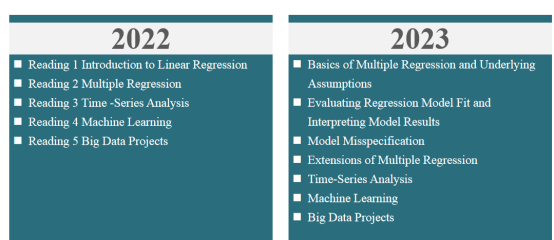2023年CFA二级考试中的Quantitative Methods科目知识变化还是有的,考生如果参加了2022年CFA二级考试再备考2023年CFA二级考试的话,就要注意这个科目的变化,跟着小编看看2023年这个科目的考纲情况!

上面是考生备考CFA二级考试这个科目章节要学习的知识对比,可以看到CFA学习章节增加了,具体是怎么回事呢?跟着小编一起看看!
一、原有的Reading2拆分之后,考纲要求也发生了变化!
(1)Basics of Multiple Regression and Underlying Assumptions
describe the types of investment problems addressed by multiple linear regression and the regression process
formulate a multiple linear regression model, describe the relation between the dependent variable and several independent variables, and interpret estimated egression coefficients
explain the assumptions underlying a multiple linear regression model and interpret residual plots indicating potential violations of these assumptions
(2)Evaluating Regression Model Fit and Interpreting Model Results
evaluate how well a multiple regression model explains the dependent variable by analyzing ANOVA table results and measures of goodness of fit
formulate hypotheses on the significance of two or more coefficients in a multiple regression model and interpret the results of the joint hypothesis tests
calculate and interpret a predicted value for the dependent variable, given the estimated regression model and assumed values for the independent variable
(3)Model Misspecification
describe how model misspecification affects the results of a regression analysis and how to avoid common forms of misspecification
explain the types of heteroskedasticity and how it affects statistical inference
explain serial correlation and how it affects statistical inference
explain multicollinearity and how it affects regression analysis
(4)Extensions of Multiple Regression
describe influence analysis and methods of detecting influential data points
formulate and interpret a multiple regression model that includes qualitative
二、Big Data Projects原有的Reading5,考纲要求发生变化!
Big Data Projects
identify and explain steps in a data analysis project
describe objectives, steps, and examples of preparing and wrangling data
evaluate the fit of a machine learning algorithm
describe objectives, methods, and examples of data exploration
describe methods for extracting, selecting and engineering features from textual data
describe objectives, steps, and techniques in model training
describe preparing, wrangling, and exploring text-based data for financial forecasting independent variables
- 报考条件
- 报名时间
- 报名费用
- 考试科目
- 考试时间
-
GARP对于FRM报考条件的规定:
What qualifications do I need to register for the FRM Program?
There are no educational or professional prerequisites needed toregister.
翻译为:报名FRM考试没有任何学历或专业的先决条件。
可以理解为,报名FRM考试没有任何的学历和专业的要求,只要是你想考,都可以报名的。查看完整内容 -
2024年5月FRM考试报名时间为:
早鸟价报名阶段:2023年12月1日-2024年1月31日。
标准价报名阶段:2024年2月1日-2024年3月31日。2024年8月FRM考试报名时间为:
早鸟价报名阶段:2024年3月1日-2024年4月30日。
标准价报名阶段:2024年5月1日-2024年6月30日。2024年11月FRM考试报名时间为:
早鸟价报名时间:2024年5月1日-2024年7月31日。
标准价报名时间:2024年8月1日-2024年9月30日。查看完整内容 -
2023年GARP协会对FRM的各级考试报名的费用作出了修改:将原先早报阶段考试费从$550上涨至$600,标准阶段考试费从$750上涨至$800。费用分为:
注册费:$ 400 USD;
考试费:$ 600 USD(第一阶段)or $ 800 USD(第二阶段);
场地费:$ 40 USD(大陆考生每次参加FRM考试都需缴纳场地费);
数据费:$ 10 USD(只收取一次);
首次注册的考生费用为(注册费 + 考试费 + 场地费 + 数据费)= $1050 or $1250 USD。
非首次注册的考生费用为(考试费 + 场地费) = $640 or $840 USD。查看完整内容 -
FRM考试共两级,FRM一级四门科目,FRM二级六门科目;具体科目及占比如下:
FRM一级(共四门科目)
1、Foundations of Risk Management风险管理基础(大约占20%)
2、Quantitative Analysis数量分析(大约占20%)
3、Valuation and Risk Models估值与风险建模(大约占30%)
4、Financial Markets and Products金融市场与金融产品(大约占30%)
FRM二级(共六门科目)
1、Market Risk Measurement and Management市场风险管理与测量(大约占20%)
2、Credit Risk Measurement and Management信用风险管理与测量(大约占20%)
3、Operational and Integrated Risk Management操作及综合风险管理(大约占20%)
4、Liquidity and Treasury Risk Measurement and Management 流动性风险管理(大约占15%)
5、Risk Management and Investment Management投资风险管理(大约占15%)
6、Current Issues in Financial Markets金融市场前沿话题(大约占10%)查看完整内容 -
2024年FRM考试时间安排如下:
FRM一级考试:
2024年5月4日-5月17日;
2024年8月3日(周六)上午;
2024年11月2日-11月15日。FRM二级考试:
2024年5月18日-5月24日;
2024年8月3月(周六)下午;
2024年11月16日-11月22日。查看完整内容
-
中文名
金融风险管理师
-
持证人数
25000(中国)
-
外文名
FRM(Financial Risk Manager)
-
考试等级
FRM考试共分为两级考试
-
考试时间
5月、8月、11月
-
报名时间
5月考试(12月1日-3月31日)
8月考试(3月1日-6月30日)
11月考试(5月1日-9月30日)








